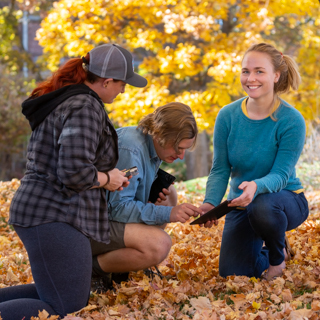Faculty Responsibilities
Every undergraduate research and creative project requires thoughtful and sustained collaboration between the student researcher and a faculty mentor. It is the responsibility of the student to seek out an appropriately qualified faculty mentor and obtain their written consent to serve in that role. The essential responsibilities of the faculty mentor are outlined below.
We strongly encourage faculty members to mentor no more than two undergraduate research or creative projects per semester, to ensure that individual students receive sufficient guidance and supervision for their research. For faculty mentors who believe they have a strong rationale for mentoring more than two student projects per semester, we encourage you to seek prior approval for this mentoring responsibility from your department chair. Your chair may ask you to identify the foreseeable impact on student researchers (including the possible value or benefit of mentoring multiple student projects) and also to explain the ways in which you will plan to manage your extended supervisory role as a faculty mentor.
Eligibility: All tenured and tenure-track faculty members at UM-Missoula are eligible to serve as faculty mentors (or second faculty readers) for undergraduate research and creative projects. Non‑tenure-track faculty and affiliate faculty may become mentors with the approval of their department chair. Faculty members at other institutions and individuals who are not faculty members but who hold appropriate academic credentials and have special knowledge or expertise appropriate to the proposed project may become faculty mentors (or second faculty readers) with the approval of the student’s department chair.
Faculty Mentor Responsibilities:
- Explore possible research topics that reflect the student’s interests and preparation.
- Identify the knowledge, experience, and skills the student needs to complete the project. The faculty mentor may advise the student to enroll in an appropriate research methods course before embarking upon the project.
- Help the student define and focus the project, including the development of a timetable to assure that the project can be completed within the time frame allotted.
- Help the student determine if his/her project will require approval from a University review committee. Any projects involving research on human subjects must receive approval from UM-Missoula’s Institutional Review Board (IRB). Similarly, if the research will involve vertebrate animals, infectious agents, hazardous chemicals, radioactive materials, recombinant DNA, and/or patents and copyrights, the student will need to submit his/her research protocol to the appropriate University review committee for approval. (In some cases, the faculty mentor may already have obtained approval for the research project.) For more information about the research approval process, see the Areas of Research Compliance website.
- Discuss with the student the details of how the proposed research or creative project will be carried out and the features of a good project proposal.
- Review and critique the student’s research proposal. Although it is the responsibility of the student to write the proposal in its entirety, it is important that the faculty mentor review the proposal in time for modifications to be made before final submission. Keep in mind that the proposal should be understandable by faculty reviewers who may not be from the specific field of study represented by the proposal.
- If the student intends to apply for an Undergraduate Research Scholarship or other research funding, then the faculty mentor should assist in the development of a budget proposal, showing estimated research expenses for books, materials, equipment, and student travel. The faculty mentor is authorized to review expenditures and approve changes to the proposed research budget.
- If the student intends to apply for an Undergraduate Research Scholarship or other research funding, the student may request the faculty mentor to write a letter of support, describing the merits of the proposed project and the student’s ability to carry it out. This letter of support should be returned to the student in a separate, sealed and signed envelope, to be attached to the student’s research funding application.
- If the student is conducting research away from UM-Missoula, discuss and identify the resources that will be available at the location of the research, including specific individuals to whom the student can turn for guidance.
- Develop a time frame and a system of communication with the student during the project period that will allow for an appropriate balance of mentor guidance and student independence. In many cases, regular weekly or biweekly meetings are optimal to keep the project on track.
- Submit any course or independent study grades related to the completion of the undergraduate research or creative project.
- Assist the student in identifying appropriate forums in which to present his/her research or creative endeavor. All UM students are encouraged to present their research and creative scholarship at the annual UM Conference on Undergraduate Research (UMCUR). Although many students choose to participate in UMCUR, other research conferences or departmental forums may also be appropriate. If possible, faculty mentors should attend their students’ research presentations.
